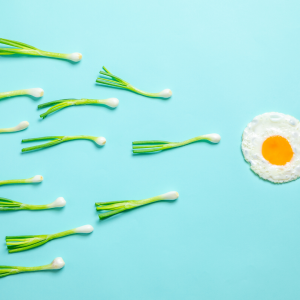Author: Mattie Hinson, ACE-CPT, Fitness Nutrition Specialist, Weight Management Specialist and Health Coach

Factors affecting fertility are great and varied amongst women. Nutrition and exercise can have big impacts for fertility health.
FIRST, let it be known that fertility health is for all premenopausal women. Often, we think about fertility equating to the act of becoming pregnant. While this is often true, your fertility has great impacts on the rest of your body health. In other words, how “fertile” you are is a great indication of your overall health. In fact, having a regular, predictable, and manageable menstrual cycle (not birth control bleed) is one of the best windows into your fertility health.
But, hold on, I said fertility health is for all women to care about even if you are not actively trying to get pregnant. Why? Your fertility is directed by other systems in the body. Often, if you are having trouble with your menstrual cycle, getting pregnant or fertility issues, something else is going wrong in the body. Fertility reflects adequate metabolic health, protects bones, and is important for cardiovascular health.
Luckily, there are some easy things you can do and include in your lifestyle to help increase your fertility and strengthen your reproductive health.
-REDUCE STRESS. This is huge. Stress in any form—be it physical, mental or emotional is a fertility killer. Make sure that you are taking time out of your busy life to do things that you enjoy and to rest.
-TRACK, TRACK, TRACK. Keep a “period journal” and write down everything from feelings, moods, hunger levels, exercise, cervical mucus (yes, you need to pay attention to that). Get in touch with your cycle length, what stressors affect it and how you feel. Having a regular, predictable cycle is a winning way to get pregnant easily. Also, there are lots of apps out there that help you keep track of what is happening with your cycle!
-SLEEP well. Ensure that you get adequate and quality sleep. Aim for 7-9 hours per night.
-EAT PLENTY. Not the time to diet. Living in a calorie deficit may cause ovulation problems which can interfere with your ability to get pregnant.
-FLAX SEED. Include about 1 tablespoon per day. Flax seed is a phytoestrogen that can help![]()
increase natural estrogen levels in your body. It has also been found to help regulate cycles.
-VITAMIN C. You may consider a Vitamin C supplement if you have a short window from the time you ovulate to the time you start your period. This is called a short luteal phase and has been linked to trouble getting or staying pregnant. Vitamin C can help extend the luteal phase!
-FULL FAT DAIRY. Ditch the fat free and low-fat products (and never go back again). Full fat dairy is protective of ovulation while low-fat and fat free dairy has been found to contribute to ovulatory dysfunction.
-FATS. Make sure you eat enough fats which help with hormone production. You will need this to make a baby, folks. Include sources like nuts, nut butters, grass-fed butter, coconut oil, avocados.
-Exercise MODERATELY. Probably not the time to start a 5-day per week boot camp program or train for a marathon. While exercise in moderation is great for your body in so many ways, it is a stressor. Remember, stress is not so good for fertility. Incorporate moderate exercise like walking, jogging and strength training a few times per week. Skip the high intensity for now.
-PRENATAL. Consider including a high-quality whole foods prenatal vitamin. Ensuring that your vitamin and mineral levels are topped off will help to ensure you have a healthy pregnancy. A LOT of baby development happens before many women even know if they are pregnant so ensuring good nutrition before pregnancy is a great idea.
-ANTIOXIDANTS. These are components in foods like vegetables, fruits and whole grains and work to keep your cells healthy. Instead of trying to aim for one type of antioxidant, include a rainbow of colors on your plate. Antioxidants help make healthy cells which will encourage a healthy cycle and fertility.
-Reduce ALCOHOL. Chronic and excessive alcohol ingestion puts a major strain on your organs and can contribute to nutrient deficiencies. However, don’t be afraid to include alcohol in moderate amounts. There are benefits including antioxidant content, micronutrients, and stress reduction if alcohol is something that you enjoy.
-TAKE CARE OF YOURSELF. In whatever form that means. Prioritize your health—physical, mental, emotional and spiritual. Chill out and find something to smile about. Have “you” time. Practice self-care. Enjoy the time before you have children. It is ALL so precious.
Remember to reach out to an expert at Nuleeu for more guidance on how your diet and exercise might be impacting your fertility health!
Schedule a Free Initial Consultation to Learn More
References:
Shmerling R. Fertility and Diet: Is there a Connection? Harvard Health Publishing. 2018. https://www.health.harvard.edu/blog/fertility-and-diet-is-there-a-connection-2018053113949.
Panth N et al. The Influence of Diet on Fertility and the Implications for Public Health Nutrition in the United States. Front Public Health. 2018. https://www.ncbi.nlm.nih.gov/pmc/articles/PMC6079277/#__ffn_sectitle.
